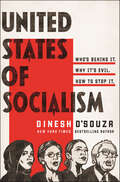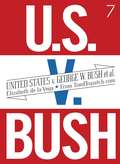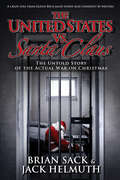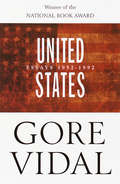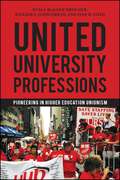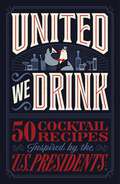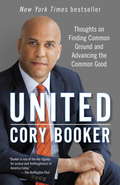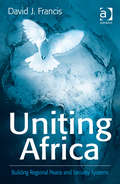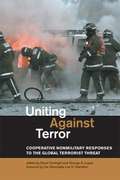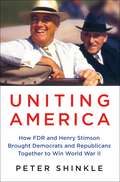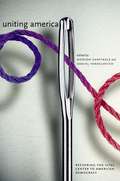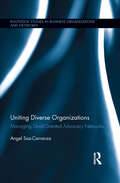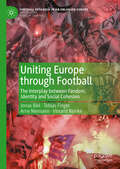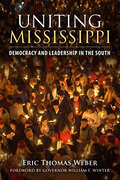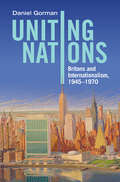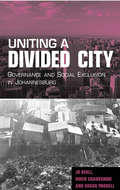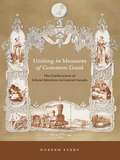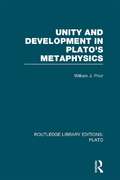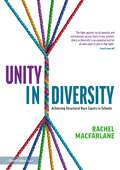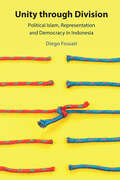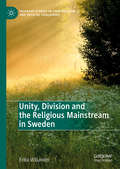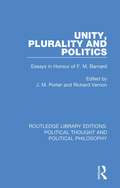- Table View
- List View
United States of Socialism: Who's Behind It. Why It's Evil. How to Stop It.
by Dinesh D'SouzaThe New York Times, USA Today, Publishers Weekly, and Wall Street Journal BestsellerFor those who witnessed the global collapse of socialism, its resurrection in the twenty-first century comes as a surprise, even a shock. How can socialism work now when it has never worked before?In this pathbreaking book, bestselling author Dinesh D’Souza argues that the socialism advanced today by the likes of Alexandria Ocasio-Cortez, Bernie Sanders, Ilhan Omar and Elizabeth Warren is very different from the socialism of Lenin, Mao and Castro. It is “identity socialism,” a marriage between classic socialism and identity politics. Today’s socialists claim to model themselves not on Mao’s Great Leap Forward or even Venezuelan socialism but rather on the “socialism that works” in Scandinavian countries like Norway and Sweden. This is the new face of socialism that D’Souza confronts and decisively refutes with his trademark incisiveness, wit and originality. He shows how socialism abandoned the working class and found new recruits by drawing on the resentments of race, gender and sexual orientation. He reveals how it uses the Venezuelan, not the Scandinavian, formula. D’Souza chillingly documents the full range of lawless, gangster, and authoritarian tendencies that they have adopted.United States of Socialism is an informative, provocative and thrilling exposé not merely of the ideas but also the tactics of the socialist Left. In making the moral case for entrepreneurs and the free market, the author portrays President Trump as the exemplar of capitalism and also the most effective political leader of the battle against socialism. He shows how we can help Trump defeat the socialist menace.
United States v. G. W. Bush et al.
by Elizabeth De La VegaWhat if there were a fraud worse than Enron and no one did anything about it?In United States v. George W. Bush et. al., former federal prosecutor Elizabeth de la Vega brings her twenty years of experience and her passion for justice to the most important case of her career. The defendants are George W Bush, Richard Cheney, Donald Rumsfeld, Condoleezza Rice, and Colin Powell. The crime is tricking the nation into war, or, in legal terms, conspiracy to defraud the United States.Ms. de la Vega has reviewed the evidence, researched the law, drafted an indictment, and in this lively, accessible book, presented it to a grand jury. If the indictment and grand jury are both hypothetical, the facts are tragically real: Over half of all Americans believe the president misled the country into a war that has left 2,500 hundred American soldiers and countless Iraqis dead. The cost is $350 billion -- and counting.The legal question is: Did the president and his team use the same techniques as those used by Enron's Ken Lay, Jeffrey Skilling, and fraudsters everywhere -- false pretenses, half-truths, deliberate omissions -- in order to deceive Congress and the American public?Take advantage of this rare opportunity to "sit" with the grand jurors as de la Vega presents a case of prewar fraud that should persuade any fair-minded person who loves this country as much as she so obviously does. Faced with an ongoing crime of such magnitude, she argues, we can not simply shrug our shoulders and walk away.
United States vs. Santa Claus
by Brian Sack Jack HelmuthThe comedic minds behind TheBlaze TV's hit show The B. S. of A. with Brian Sack bring you their hilarious vision of Christmas Future-or possibly sooner. What happens when the Scrooge-iest Washington politicians take on the jolliest soul of all time? Can a scandal-plagued administration distract the American public by bringing Santa to his knees? Can a bumbling bureaucracy destroy the reputation of the most popular man in the Northern Hemisphere? Spoiler alert: YES! And faster than you can say ho-ho-ho! This is the sad story of the real war on Christmas-and how the NSA, IRS, OSHA, and every other acronym in Washington came gunning for the man in red with everything they've got: two-thousand page reports on the environmental impact of reindeer farts . . . unionized elves . . . suspicious audits . . . character assassination . . . and all the other cruel and unusual tactics of an out-of-control government. Yes, Virginia, there was a Santa Claus. This is his story.
United States vs. the Cuban Five: A Judicial Coverup
by Rodolfo Dávalos FernándezTheir crime was keeping the government of Cuba informed of the activities of counter-revolutionary terrorist groups in Miami whose unbroken record of violent attacks on Cuba and supporters of the Cuban Revolution begins in the 1960s and continues to this day.
United States: Essays, 1952-1992
by Gore VidalFrom the age of Eisenhower to the dawning of the Clinton era, Gore Vidal’s United States offers an incomparably rich tapestry of American intellectual and political life in a tumultuous period. It also provides the best, most sustained exposure possible to the most wide-ranging, acute, and original literary intelligence of the post—World War II years. United States is an essential book in the canon of twentieth-century American literature and an endlessly fascinating work.
United University Professions: Pioneering in Higher Education Unionism
by William E. Scheuerman Nuala McGann Drescher Ivan D. SteenPublic education, from pre-K through higher education, and labor unions, particularly those representing public sector workers, are today under attack from those who question the very need to have such basic institutions. United University Professions is a history of United University Professions (UUP), which grew from humble beginnings to become the nation's largest higher education union, representing some 35,000 academic and professional staff within the State University of New York (SUNY) system. Nuala McGann Drescher, William E. Scheuerman, and Ivan D. Steen chronicle how UUP built upon its early accomplishments at the bargaining table and in the political arena to become a national leader in the struggle to preserve academic freedom and the institution of tenure, the bedrock of academic freedom. More broadly, they argue, UUP in microcosm confirms the importance of unionization not only for the members it represents, but to core American values and American democracy itself.
United We Drink: 50 Cocktail Recipes Inspired by the US Presidents
by Harper CelebrateDrink like a true American this election season with fun and creative presidential-themed cocktails! Whether you like a more conservative pour or are liberal with your libations, let's embrace the pursuit of happiness.It's election season, and if you're anything like most Americans, you like your ballots with a side of booze and your suffrage accompanied by something tall and stiff. In United We Drink, you're invited to celebrate the nation one presidential-themed cocktail at a time.Whether your political views come "with a twist" or are a little more "old-fashioned," this book has you covered. Inside this must-have bartender handbook you'll find:45 easy cocktail and mocktail recipes inspired by each of the presidents5 themed drinks for Republicans, Democrats, and Independents, with guided cutting lines so you can cut out whatever doesn't suit youInspirational, artfully designed quotes from Founding Fathers and former presidents Some of the all-American, presidentially-themed cocktails featured in United We Drink include:Cherry Nelson (inspired by George Washington)Massachusetts Mimosa (inspired by John Adams)Apple Rosemary Gin and Tonic (inspired by Abraham Lincoln)Irish Hot Chocolate (inspired by Chester A. Arthur)Hot Teddy (inspired by Theodore Roosevelt)Mezcal Margarita inspired by (Dwight D. Eisenhower)Frozen Strawberry Jackuiri (inspired by John F. Kennedy)Peaceful Peach Spritzer (inspired by Jimmy Carter) United We Drink is a must for:Election-night partiesPresidential debatesFourth of July get-togethersMemorial Day cookoutsAnd any night you're just feeling a little patriotic. With accessible ingredients and easy-to-follow directions, these recipes are made with the home bartender in mind. United We Drink is your party ticket to good times and fabulous drinks no matter which side of the aisle you sit on. So, raise your glass to America and enjoy something tall, refreshing, and cool this election season (or any season for that matter)!
United We Stand
by Ross PerotThis is the book that was published during Perot's 1992 presidential campaigne. In it, Ross outlines his vision for America-a vision destroyed when Bill Clinton was elected by a 43% minority.
United: Thoughts on Finding Common Ground and Advancing the Common Good
by Cory BookerA passionate new voice in American politics, United States Senator Cory Booker makes the case that the virtues of empathy, responsibility, and action must guide our nation toward a brighter future. Raised in northern New Jersey, Cory Booker went to Stanford University on a football scholarship, accepted a Rhodes Scholarship to Oxford University, then studied at Yale Law School. Graduating from Yale, his options were limitless. He chose public service. He chose to move to a rough neighborhood in Newark, New Jersey, where he worked as a tenants' rights lawyer before winning a seat on the City Council. In 2006, he was elected mayor, and for more than seven years he was the public face of an American city that had gone decades with too little positive national attention and investment. In 2013, Booker became the first African American elected to represent New Jersey in the U.S. Senate. In United, Cory Booker draws on personal experience to issue a stirring call to reorient our nation and our politics around the principles of compassion and solidarity. He speaks of rising above despair to engage with hope, pursuing our shared mission, and embracing our common destiny. Here is his account of his own political education, the moments--some entertaining, some heartbreaking, all of them enlightening--that have shaped his civic vision. Here are the lessons Booker learned from the remarkable people who inspired him to serve, men and women whose example fueled his desire to create opportunities for others. Here also are his observations on the issues he cares about most deeply, from race and crime and the crisis of mass incarceration to economic and environmental justice. "Hope is the active conviction that despair will never have the last word," Booker writes in this galvanizing book. In a world where we too easily lose touch with our neighbors, he argues, we must remember that we all rise or fall together--and that we must move beyond mere tolerance for one another toward a deeper connection: love.From the Hardcover edition.
Uniting Africa: Building Regional Peace and Security Systems
by David J. FrancisPlagued by bloody wars and armed conflicts, political instability, communal violence and displaced persons, and at the mercy of natural catastrophes such as drought and famine, it is not surprising that the Western press has long dismissed Africa as the 'hopeless continent'. In the face of these challenges, Africa today is faced with a stark choice: either unite or perish. The debate on why and how the continent should unite in terms of co-operative peace, security and development is more urgent than at any other time in Africa's post-colonial history. Moving forward from the failure of the earlier, typically idealistic Africa unity project, David Francis demonstrates how peace and security challenges have created the imperative for change. He argues that a series of regional peace and security systems are emerging, and that states that have participated in practical experiments in regional peacekeeping, peace support operations, conflict stabilization/management and preventive diplomacy are building de facto systems of peace and security that could be institutionalized and extended.
Uniting Against Terror: Cooperative Nonmilitary Responses To The Global Terrorist Threat
by David Cortright George A. LopezAs terrorist attacks continue around the world, from London and Madrid to Afghanistan and Iraq, questions multiply about the effectiveness of current antiterrorist strategies. America's reliance on military approaches and the Bush administration's avowal of a constant state of war have overshadowed nonmilitary, multilateral efforts, and there has been an analogous neglect of these alternative strategies in the literature on terrorism. Uniting Against Terrorfills this gap, examining and evaluating post-9/11 cooperative nonmilitary responses to the global terrorist threat, with a particular focus on efforts of the United Nations, the Financial Action Task Force, the European Union, and a wide array of multilateral institutions. Uniting Against Terror argues that defeating the global terrorist threat requires engaging international financial, diplomatic, intelligence, and defense communities and law enforcement organizations in an atmosphere of cooperation. It examines cooperative diplomatic and economic policies to address the changing face of terrorism and the global Al Qaida threat, differentiates between protective measures and long-term preventive policies, and makes recommendations for effective cooperative nonmilitary strategies. Included are chapters that analyze the UN and its role, the unique blend of sanctions and diplomacy that convinced Libya to end its support of terrorism, efforts to halt the financing of terrorist networks, and an account of the European Union's unified "Plan of Action" against terrorism.
Uniting America: How FDR and Henry Stimson Brought Democrats and Republicans Together to Win World War II
by Peter ShinkleThe untold story of the most crucial bipartisan alliance in United States history.As Adolf Hitler’s Nazi armies threatened Europe, Democratic President Franklin D. Roosevelt urged a divided America to mobilize to defend democracy and freedom. Many Republicans accused FDR of leading the nation needlessly into war and demanded that America remain neutral. On June 20, 1940, FDR shocked the country by announcing that two prominent Republicans would take posts in his cabinet. Henry Stimson, former President Herbert Hoover’s secretary of state, became secretary of war, and Frank Knox, the Republican vice-presidential candidate in 1936, became secretary of the navy.Roosevelt intended the appointments to build national unity. But building a coalition across party lines was a risky move that could have backfired politically. It also placed a bipartisan relationship at the center of America’s confrontation with global fascism. FDR’s Republican allies went on to play critical roles in leading the war effort, and many bills passed Congress during the war years with strong backing from both parties. Following Roosevelt’s death, Stimson continued to champion bipartisanship under President Truman in the closing chapter of the war. This alliance stands as a historic example of united leadership in a nation scarred by political division.Uniting America is the first book to paint a full portrait of this extraordinary collaboration, tracing it back to its origins in 1933. Author Peter Shinkle reveals the true extent of bipartisanship during the war, including previously undisclosed information about Stimson’s work with 1940 Republican presidential nominee Wendell Willkie and other Republicans who supported FDR. This fascinating and deeply researched book is a must-read for anyone who believes America must once again unite to defend democracy at home and abroad.
Uniting America: Restoring the Vital Center to American Democracy
by Daniel Yankelovich Norton GarfinkleIn Uniting America, some of the country's most prominent social thinkers-among them Francis Fukuyama, Daniel Yankelovich, Amitai Etzioni, Alan Wolfe, Uwe Reinhardt, and Thomas E. Mann-reject the myth of polarization. On topics ranging from the war on terrorism, health care, economic policy, and Social Security to religion, diversity, and immigration, the authors argue that there are sensible, centrist solutions that are more in keeping with prevailing public sentiment and that would better serve the national interest. On issue after issue, the authors show how the conventional framing of the debate in Washington has misled Americans, creating a series of false dilemmas and forcing choices between two extremes-at the expense of more balanced and pragmatic policy solutions based on enduring American values. Uniting America provides a blueprint for a fresh approach to American politics, grounded in moderation, pragmatism, and the shared values that unite Americans.
Uniting Diverse Organizations: Managing Goal-Oriented Advocacy Networks (Routledge Studies in Business Organizations and Networks)
by Angel Saz-CarranzaNetworks are made up of organizations. Often a central unit, or "Network Administrative Organization" (NAO), manages an entire network of organizations that collaborate to achieve an overall network-level goal. Goal-directed networks are those that come together to achieve a shared objective, in addition to the individual organization-specific goals. This book’s focus is on the management of goal-directed networks. Despite the fact that formalized goal-directed interorganizational networks have become extremely popular in the public and nonprofit sectors, as many social problems require concerted action, publications on managing goal-directed networks do not exist. In this book, author Angel Saz-Carranza examines four networks that differ by size, scope, and geographical location. He offers a novel and innovative framework focusing on networks’ inherent internal tensions between unity and diversity, paralleling the differentiation/integration tension found in organization theory, which has not previously been applied to interorganizational networks.
Uniting Europe through Football: The Interplay between Fandom, Identity and Social Cohesion (Football Research in an Enlarged Europe)
by Arne Niemann Jonas Biel Tobias Finger Vincent ReinkeThe book explores how football fandom as a leisure and lifeworld activity can contribute to strengthening identification with and social cohesion in Europe. Based on the three-year research project &“FANZinE&” (Football as the basis for social cohesion in Europe), financed by the German Federal Ministry of Education and Research (BMBF), the book allows readers to understand the intersection and causal interaction between football fandom, European identities, and social cohesion in Europe, using four European countries Germany, Norway, Poland, and Spain. This book is aimed at those engaged in football and broader sport research, European Studies, as well as identity and social cohesion research. It will also be of interest to advanced students in the fields of Political Science, International Relations, European Studies, Sports Studies, and Sociology.
Uniting Mississippi: Democracy and Leadership in the South
by Eric Thomas WeberUniting Mississippi applies a new, philosophically informed theory of democratic leadership to Mississippi's challenges. Governor William F. Winter has written a foreword for the book, supporting its proposals.The book begins with an examination of Mississippi's apparent Catch-22, namely the difficulty of addressing problems of poverty without fixing issues in education first, and vice versa. These difficulties can be overcome if we look at their common roots, argues Eric Thomas Weber, and if we practice virtuous democratic leadership. Since the approach to addressing poverty has for so long been unsuccessful, Weber reframes the problem. The challenges of educational failure reveal the extent to which there is a caste system of schooling. Certain groups of people are trapped in schools that are underfunded and failing. The ideals of democracy reject hierarchies of citizenship, and thus, the author contends, these ideals are truly tested in Mississippi. Weber offers theories of effective leadership in general and of democratic leadership in particular to show how Mississippi's challenges could be addressed with the guidance of common values.The book draws on insights from classical and contemporary philosophical outlooks on leadership, which highlight four key social virtues: wisdom, courage, moderation, and justice. Within this framework, the author approaches Mississippi's problems of poverty and educational frustration in a novel way that is applicable in and beyond the rural South. Weber brings to bear each of the virtues of democratic leadership on particular problems, with some overarching lessons and values to advance. The author's editorial essays are included in the appendix as examples of engaging in public inquiry for the sake of democratic leadership.
Uniting Nations: Britons and Internationalism, 1945–1970
by Daniel GormanUniting Nations is a comparative study of Britons who worked in the United Nations and international non-governmental and civil society organizations from 1945 to 1970 and their role in forging the postwar international system. Daniel Gorman interweaves the personal histories of scores of individuals who worked in UN organizations, the world government movement, Quaker international volunteer societies, and colonial freedom societies to demonstrate how international public policy often emerged 'from the ground up.' He reveals the importance of interwar, Second World War, colonial, and voluntary experiences in inspiring international careers, how international and national identities intermingled in the minds of international civil servants and civil society activists, and the ways in which international policy is personal. It is in the personal relationships forged by international civil servants and activists, positive and negative, biased and altruistic, short-sighted or visionary, that the “international” is to be found in the postwar international order.
Uniting a Divided City: Governance and Social Exclusion in Johannesburg
by Susan Parnell Jo Beall Owen CrankshawFor many, Johannesburg resembles the imagined spectre of the urban future. Global anxieties about catastrophic urban explosion, social fracture, environmental degradation, escalating crime and violence, and rampant consumerism alongside grinding poverty, are projected onto this city as a microcosm of things to come. Decision-makers in cities worldwide have attempted to balance harsh fiscal and administrative realities with growing demands for political, economic and social justice. This book investigates pragmatic approaches to urban economic development, service delivery, spatial restructuring, environmental sustainability and institutional reform in Johannesburg. It explores the conditions and processes that are determining the city's transformation into a cosmopolitan metropole and magnet for the continent.
Uniting in Measures of Common Good
by Darren FerryFerry examines a wide selection of voluntary societies - mechanics' institutes, mutual benefit organizations, agricultural associations, temperance societies, and literary and scientific associations. He reinterprets the history of these organizations in terms of their own internal tensions over liberal doctrines and the effect of social, cultural, and economic change and compares the effects of liberalism on rural and urban associations and on societies in both English and French Canada.
Unity and Development in Plato's Metaphysics (Routledge Library Editions: Plato)
by William PriorStudies of Plato’s metaphysics have tended to emphasise either the radical change between the early Theory of Forms and the late doctrines of the Timaeus and the Sophist, or to insist on a unity of approach that is unchanged throughout Plato’s career. The author lays out an alternative approach. Focussing on two metaphysical doctrines of central importance to Plato’s thought – the Theory of Forms and the doctrine of Being and Becoming – he suggests a continuous progress can be traced through Plato’s works. He presents his argument through an examination of the metaphysical sections of six of the dialogues: the Euthyphro, Phaedo, Republic, Parmenides, Timaeus, and Sophist.
Unity in Diversity: Achieving Structural Race Equity in Schools
by Rachel MacfarlaneA third of all children in our schools are from racially minoritised backgrounds. Yet the data on attainment, exclusion, progression and representation indicates that our education system is structurally racist. Unity in Diversity explores the unconscious biases at play in our schools and demonstrates how educators can address this by improving representation in the curriculum, staffroom and on the governing/trust board. Drawing on case studies from leaders, this book demonstrates what schools are already doing to create an impactful anti-racist ethos and how these strategies may be applied in practice. Written by an experienced headteacher who has supported a diverse range of schools in improving their race equity, each chapter addresses a different aspect of race inequality and provides practical strategies for overcoming it. This book empowers readers: To acknowledge that systemic race inequality exists in schools and that this necessitates an anti-racist approach To become comfortable talking about race and to create safe spaces for staff and students to engage in discussions about race To address unconscious biases and white fragility and to examine the inequality and underrepresentation of ethnic groups To audit all aspects of educational provision to determine what needs to change and to action and implement this change with lasting impact. Schools and teachers can play a major role in eliminating systemic racism in society. This book is an essential read for any teacher, leader, governor or trustee who is restless to address race inequity in our education system, creating a more equal and represented school community.
Unity in Faith?: Edinoverie, Russian Orthodoxy, and Old Belief, 1800–1918
by J. M. WhiteThe little known history of an attempt to end a religious schism in imperial Russia, and the questions it raised about church and state.Established in 1800, edinoverie (translated as “unity in faith”) was intended to draw back those who had broken with the Russian Orthodox Church over ritual reforms in the seventeenth century. Called Old Believers, they had been persecuted as heretics. In time, the Russian state began tolerating Old Believers in order to lure them out of hiding and make use of their financial resources as a means of controlling and developing Russia’s vast and heterogeneous empire.However, the Russian Empire was also an Orthodox state, and conversion from Orthodoxy constituted a criminal act. So, which was better for ensuring the stability of the Russian Empire: managing heterogeneity through religious toleration, or enforcing homogeneity through missionary campaigns? Edinoverie remained contested and controversial throughout the nineteenth and early twentieth centuries, as it was distrusted by both the Orthodox Church and the Old Believers themselves. The state reinforced this ambivalence, using edinoverie as a means by which to monitor Old Believer communities and employing it as a carrot to the stick of prison, exile, and the deprivation of rights.In Unity in Faith?, James White’s study of edinoverie offers an unparalleled perspective of the complex triangular relationship between the state, the Orthodox Church, and religious minorities in imperial Russia.
Unity through Division: Political Islam, Representation and Democracy in Indonesia
by Diego FossatiIndonesia, like many other countries around the world, is currently experiencing the process of democratic backsliding, marked by a toxic mix of religious sectarianism, polarization, and executive overreach. Despite this trend, Indonesians have become more, rather than less, satisfied with their country's democratic practice. What accounts for this puzzle? Unity Through Division examines an overlooked aspect of democracy in Indonesia: political representation. In this country, an ideological cleavage between pluralism and Islamism has long characterized political competition. This cleavage, while divisive, has been a strength of Indonesia's democracy, giving meaning to political participation and allowing a degree of representation not often observed in young democracies. While the recent resurgence of radical Islam and political polarization in Indonesian politics may have contributed to democratic erosion, these factors have simultaneously clarified political alternatives and improved perceptions of representation, in turn bolstering democratic participation and satisfaction. This compelling book effectively challenges the wisdom of the role of Islam in Indonesian political life and provides a fresh analysis for debates on democratic backsliding in Indonesia and beyond.
Unity, Division and the Religious Mainstream in Sweden (Palgrave Studies in Lived Religion and Societal Challenges)
by Erika WillanderThis book presents new conceptual and methodological approaches to studying religiosity in Europe. From her unique background of working with the Church of Sweden statistics and official statistics on the increasing religious diversity in Sweden, Willander illustrates how previous and current methods of analysing religiosity overlook substantial aspects in patterns of affiliation, belief and practice. Unity, Division and the Religious Mainstream in Sweden draws on the sociological imagination in the sociology of religion to offer a new and empirically-driven analytical framework that shifts the focus to religious change in general, and will contribute greatly to ongoing discussions about majority forms of religiosity and their social relevance in contemporary times. It will be of use to students and scholars with a focus on the sociology of religion, as well as sociology, political science, epistemology and media studies.
Unity, Plurality and Politics: Essays in Honour of F. M. Barnard (Routledge Library Editions: Political Thought and Political Philosophy #46)
by Richard Vernon J. M. PorterFirst published in 1986. Nations have a unity often described as 'cultural'; and within them there are divergences some of which are termed 'political'. But culture and politics do not, therefore, comprise two wholly distinct zones or orders of experience, the one marked by unity, the other by plurality. Unity and plurality interpenetrate. These insights, which derive from the thinking of Herder, have been fundamental to the work of F. M. Barnard. In this volume a number of scholars contribute, in Barnardian vein, reflections on the tensions between unity and plurality in the history of ideas. The central underlying question is, in essence, ’what is the context of political life?’ The question remains of more importance than any single answer.
